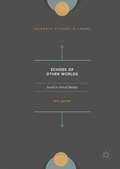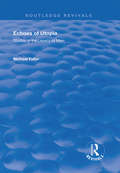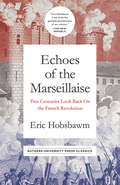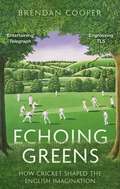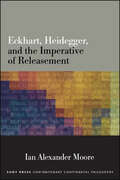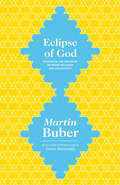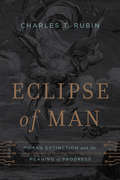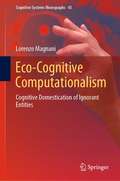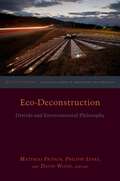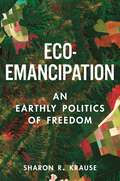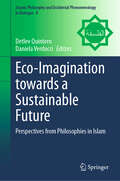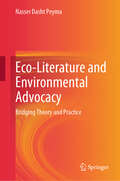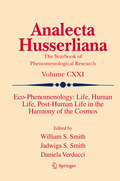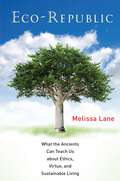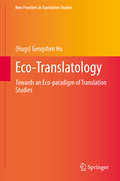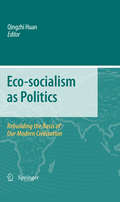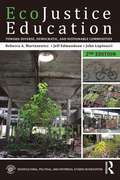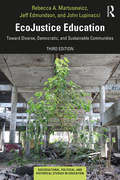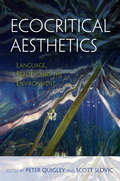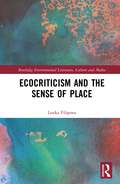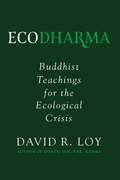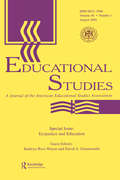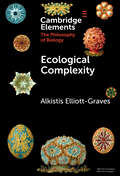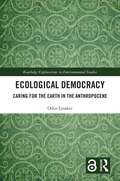- Table View
- List View
Echoes of Other Worlds: Sound in Virtual Reality
by Tom A. GarnerThis book explores the nature and importance of sound in virtual reality (VR). Approaching the subject from a holistic perspective, the book delivers an emergent framework of VR sound. This framework brings together numerous elements that collectively determine the nature of sound in VR; from various aspects of VR technology, to the physiological and psychological complexities of the user, to the wider technological, historical and sociocultural issues. Garner asks, amongst other things: what is the meaning of sound? How have fictional visions of VR shaped our expectations for present technology? How can VR sound hope to evoke the desired responses for such an infinitely heterogeneous user base? This book if for those with an interest in sound and VR, who wish to learn more about the great complexities of the subject and discover the contemporary issues from which future VR will surely advance.
Echoes of Utopia: Studies in the Legacy of Marx (Routledge Revivals)
by Michael FullerThis title was first published in 2000. A 'generous soul' with 'ideas of genius' but a 'puerile idolater - Marx and his legacy remains an important focus for philosophers, economists, political scientists and others, but is Marxism dead and best forgotten, or is its relevance undiminished? Echoes of Utopia sets out to explore the relevance of Marxism in the contemporary world, through economic, political and human dimensions. Combining philosophical analysis of central economic and political concepts with an historically based examination of the unfolding of the twentieth century global economy, the author explores the work of Marx as well as two of his most trenchant critics, Schumpeter and Weil. While critical of that central pillar of Marxism, the labour theory of value,the author concludes that some of Marx's ideas, especially those concerning over-production, under-consumption, crises, planning, and international democratic governance, are more relevant than ever in today's world of economic, political and environmental turbulence.
Echoes of the Marseillaise: Two Centuries Look Back on the French Revolution (Mason Welch Gross Lecture Series)
by Eric HobsbawmWhat was the French Revolution? Was it the triumph of Enlightenment humanist principles, or a violent reign of terror? Did it empower the common man, or just the bourgeoisie? And was it a turning point in world history, or a mere anomaly? E.J. Hobsbawm’s classic historiographic study—written at the very moment when a new set of revolutions swept through the Eastern Bloc and brought down the Iron Curtain—explores how the French Revolution was perceived over the following two centuries. He traces how the French Revolution became integral to nineteenth-century political discourse, when everyone from bourgeois liberals to radical socialists cited these historical events, even as they disagreed on what their meaning. And he considers why references to the French Revolution continued to inflame passions into the twentieth century, as a rhetorical touchstone for communist revolutionaries and as a boogeyman for social conservatives. Echoes of the Marseillaise is a stimulating examination of how the same events have been reimagined by different generations and factions to serve various political agendas. It will give readers a new appreciation for how the French Revolution not only made history, but also shaped our fundamental notions about history itself.
Echoing Greens: How Cricket Shaped the English Imagination
by Brendan CooperThe importance of cricket to England has been immortalised in the art and literature of a thousand years. For countless artists and writers across the centuries, the culture and aesthetics of cricket - white-clad players, the crack of bat on ball, booming appeals, admiring applause, figures running up to bowl, batsmen leaning, waiting, swinging the blade - have been as essential to the English landscape as the hills and meadows immortalised by Gainsborough, Constable and Turner.It is a story that is known in part, but one that has never been explored in full. And it is lined with surprises, forgotten tales and unnoticed details - ranging from medieval manuscript illustrations, through a dazzling variety of visual art, poetry, fiction and drama, to recent portraits of contemporary heroes.Echoing Greens is a fascinating and thoughtful exploration of the bond between cricket and the English imagination. It unveils that beneath cosy patriotic dreams of 'English values', a much wilder, more complex story exists. Alongside stories of heroic figures, noble values, and pastoral idylls, the literature and the art of cricket also tell of vice, violence, and scandal. The result is a thrilling investigation into the true story behind these representations of the game, and forces us to reconsider the history of cricket itself.
Echoing Greens: How Cricket Shaped the English Imagination
by Brendan CooperThe importance of cricket to England has been immortalised in the art and literature of a thousand years. For countless artists and writers across the centuries, the culture and aesthetics of cricket - white-clad players, the crack of bat on ball, booming appeals, admiring applause, figures running up to bowl, batsmen leaning, waiting, swinging the blade - have been as essential to the English landscape as the hills and meadows immortalised by Gainsborough, Constable and Turner.It is a story that is known in part, but one that has never been explored in full. And it is lined with surprises, forgotten tales and unnoticed details - ranging from medieval manuscript illustrations, through a dazzling variety of visual art, poetry, fiction and drama, to recent portraits of contemporary heroes.Echoing Greens is a fascinating and thoughtful exploration of the bond between cricket and the English imagination. It unveils that beneath cosy patriotic dreams of 'English values', a much wilder, more complex story exists. Alongside stories of heroic figures, noble values, and pastoral idylls, the literature and the art of cricket also tell of vice, violence, and scandal. The result is a thrilling investigation into the true story behind these representations of the game, and forces us to reconsider the history of cricket itself.
Eckhart, Heidegger, and the Imperative of Releasement (SUNY series in Contemporary Continental Philosophy)
by Ian Alexander MooreIn the late Middle Ages the philosopher and mystic Meister Eckhart preached that to know the truth you must be the truth. But how to be the truth? Eckhart's answer comes in the form of an imperative: release yourself, let be. Only then will you be able to understand that the deepest meaning of being is releasement and become who you truly are. This book interprets Eckhart's Latin and Middle High German writings under the banner of an imperative of releasement, and then shows how the twentieth-century thinker Martin Heidegger creatively appropriates this idea at several stages of his career. Heidegger had a lifelong fascination with Eckhart, referring to him as "the old master of letters and life." Drawing on archival material and Heidegger's marginalia in his personal copies of Eckhart's writings, Moore argues that Eckhart was one of the most important figures in Heidegger's philosophy. This book also contains previously unpublished documents by Heidegger on Eckhart, as well as the first English translation of Nishitani Keiji's essay "Nietzsche's Zarathustra and Meister Eckhart," which he initially gave as a presentation in one of Heidegger's classes in 1938.
Eclipse of God
by Martin Buber Leora BatnitzkyBiblical in origin, the expression "eclipse of God" refers to the Jewish concept of hester panim, the act of God concealing his face as a way of punishing his disobedient subjects. Though this idea is deeply troubling for many people, in this book Martin Buber uses the expression hopefully--for a hiding God is also a God who can be found. First published in 1952, Eclipse of God is a collection of nine essays concerning the relationship between religion and philosophy. The book features Buber's critique of the thematically interconnected--yet diverse--perspectives of Soren Kierkegaard, Hermann Cohen, C.G. Jung, Martin Heidegger, and other prominent modern thinkers. Buber deconstructs their philosophical conceptions of God and explains why religion needs philosophy to interpret what is authentic in spiritual encounters. He elucidates the religious implications of the I-Thou, or dialogical relationship, and explains how the exclusive focus on scientific knowledge in the modern world blocks the possibility of a personal relationship with God. Featuring a new introduction by Leora Batnitzky, Eclipse of God offers a glimpse into the mind of one of the modern world's greatest Jewish thinkers.
Eclipse of Man
by Charles T. RubinTomorrow has never looked better. Breakthroughs in fields like genetic engineering and nanotechnology promise to give us unprecedented power to redesign our bodies and our world. Futurists and activists tell us that we are drawing ever closer to a day when we will be as smart as computers, will be able to link our minds telepathically, and will live for centuries-or maybe forever. The perfection of a "post-human" future awaits us.Or so the story goes. In reality, the rush toward a post-human destiny amounts to an ideology of human extinction, an ideology that sees little of value in humanity except the raw material for producing whatever might come next.In Eclipse of Man, Charles T. Rubin traces the intellectual origins of the movement to perfect and replace the human race. He shows how today's advocates of radical enhancement are-like their forebears-deeply dissatisfied with given human nature and fixated on grand visions of a future shaped by technological progress.Moreover, Rubin argues that this myopic vision of the future is not confined to charlatans and cheerleaders promoting this or that technology: it also runs through much of modern science and contemporary progressivism. By exploring and criticizing the dreams of post humanity, Rubin defends a more modest vision of the future, one that takes seriously both the limitations and the inherent dignity of our given nature.
Eco-Cognitive Computationalism: Cognitive Domestication of Ignorant Entities (Cognitive Systems Monographs #43)
by Lorenzo MagnaniThis book mainly focuses on the widely distributed nature of computational tools, models, and methods, ultimately related to the current importance of computational machines as mediators of cognition. An entirely new eco-cognitive approach to computation is offered, to underline the question of the overwhelming cognitive domestication of ignorant entities, which is persistently at work in our current societies. Eco-cognitive computationalism does not aim at furnishing an ultimate and static definition of the concepts of information, cognition, and computation, instead, it intends, by respecting their historical and dynamical character, to propose an intellectual framework that depicts how we can understand their forms of “emergence” and the modification of their meanings, also dealing with impressive unconventional non-digital cases. The new proposed perspective also leads to a clear description of the divergence between weak and strong levels of creative “abductive” hypothetical cognition: weak accomplishments are related to “locked abductive strategies”, typical of computational machines, and deep creativity is instead related to “unlocked abductive strategies”, which characterize human cognizers, who benefit from the so-called “eco-cognitive openness”.
Eco-Deconstruction: Derrida and Environmental Philosophy (Groundworks: Ecological Issues in Philosophy and Theology)
by Matthias Fritsch, Philippe Lynes, and David WoodEco-Deconstruction marks a new approach to the degradation of the natural environment, including habitat loss, species extinction, and climate change. While the work of French philosopher Jacques Derrida (1930–2004), with its relentless interrogation of the anthropocentric metaphysics of presence, has already proven highly influential in posthumanism and animal studies, the present volume, drawing on published and unpublished work by Derrida and others, builds on these insights to address the most pressing environmental issues of our time.The volume brings together fifteen prominent scholars, from a wide variety of related fields, including eco-phenomenology, eco-hermeneutics, new materialism, posthumanism, animal studies, vegetal philosophy, science and technology studies, environmental humanities, eco-criticism, earth art and aesthetics, and analytic environmental ethics. Overall, eco-deconstruction offers an account of differential relationality explored in a non-totalizable ecological context that addresses our times in both an ontological and a normative register.The book is divided into four sections. “Diagnosing the Present” suggests that our times are marked by a facile, flattened-out understanding of time and thus in need of deconstructive dispositions. “Ecologies” mobilizes the spectral ontology of deconstruction to argue for an originary environmentality, the constitutive ecological embeddedness of mortal life. “Nuclear and Other Biodegradabilities,” examines remains, including such by-products and disintegrations of human culture as nuclear waste, environmental destruction, and species extinctions. “Environmental Ethics” seeks to uncover a demand for justice, including human responsibility for suffering beings, that emerges precisely as a response to original differentiation and the mortality and unmasterable alterity it installs in living beings. As such, the book will resonate with readers not only of philosophy, but across the humanities and the social and natural sciences.
Eco-Emancipation: An Earthly Politics of Freedom
by Sharon R. KrauseThe case for an eco-emancipatory politics to release the Earth from human domination and free us all from lives that are both exploitative and exploitedHuman domination of nature shapes every aspect of our lives today, even as it remains virtually invisible to us. Because human beings are a part of nature, the human domination of nature circles back to confine and exploit people as well—and not only the poor and marginalized but also the privileged and affluent, even in the world’s most prosperous societies. Although modern democracy establishes constraints intended to protect people from domination as the arbitrary exercise of power, it offers few such protections for nonhuman parts of nature. The result is that, wherever we fall in human hierarchies, we inevitably find ourselves both complicit in and entrapped by a system that makes sustainable living all but impossible. It confines and exploits not only nature but people too, albeit in different ways. In Eco-Emancipation, Sharon Krause argues that we can find our way to a better, freer life by constraining the use of human power in relation to nature and promoting nature’s well-being alongside our own, thereby releasing the Earth from human domination and freeing us from a way of life that is both exploitative and exploited, complicit and entrapped. Eco-emancipation calls for new, more-than-human political communities that incorporate nonhuman parts of nature through institutions of representation and regimes of rights, combining these new institutional arrangements with political activism, a public ethos of respect for nature, and a culture of eco-responsibility.
Eco-Imagination towards a Sustainable Future: Perspectives from Philosophies in Islam (Islamic Philosophy and Occidental Phenomenology in Dialogue #8)
by Detlev Quintern Daniela VerducciThe Volume brings together scholars from Azerbaijan, Egypt, Germany, India, Iran, Iraq, Italy, the Netherlands, and Turkey to approach the new field of Eco-Imagination from various philosophical and disciplinary backgrounds. Sufism and its Micro-Macro philosophy in Ikhwan al-Safa, Ibn Arabi, Suhrawardy, Nishabouri, and Mulla Sadra are in dialogue with the Logos of Life Philosophy founded by Anna-Teresa Tymieniecka (1923 – 2014). This book provides a multi-perspective insight into the understanding of Life in Islamic Philosophies. Philosophers, mystics, and poets from a variety of Islamic countries, schools, and worldviews are introduced and debated. Sustainable futures evolved in harmony with everything there is alive (Anna-Teresa Tymieniecka), are currently more threatened than ever. Wars, ecological destructivity, the climate crisis, and not least the crisis of the Human Being call urgently for a cross-religious, cultural, and generational understanding. Lively debates in Islam, taking place on philosophical problems for hundreds of years, often based on the same roots as in Occidental Phenomenology, e.g., Plato, Aristotle, and Plotinus, are still too little known in the Occident/West. The prolific and poetic arguments, introduced for the first time in an eco-imaginative horizon, do not belong to the past. This volume invites students and researchers to uncover Islamic Philosophies’ potentialities for a shared sustainable future.
Eco-Literature and Environmental Advocacy: Bridging Theory and Practice
by Nasser Dasht PeymaThis book offers a comprehensive exploration of the power of eco-literature to inspire environmental activism and ethical stewardship. It uniquely blends literary analysis, environmental advocacy, and interdisciplinary perspectives to showcase how literature serves as a catalyst for global change. By integrating poetry, visual arts, and storytelling, the book provides readers with a unique, multidimensional approach to understanding the environmental crisis. It stands out for its global and cultural scope, drawing on Indigenous narratives and cross-cultural perspectives. It weaves together the works of eco-literary pioneers like Thoreau, Muir, and Leopold with contemporary authors such as Amitav Ghosh and Margaret Atwood. The book&’s case studies offer practical insights into how eco-literature has influenced policy and activism, making it both an intellectual resource and a guide for real-world impact. Through practical case studies, it offers insights into how eco-literature influences policy and activism, making it an essential resource for scholars, activists, and students. It serves as a bridge between academic theory and practical application. A valuable book for those interested in the intersection of literature, culture, and environmental justice, providing the tools needed to foster a more sustainable and ethical world.
Eco-Phenomenology: Life, Human Life, Post-Human Life in the Harmony of the Cosmos (Analecta Husserliana #CXXI)
by William S. Smith Jadwiga S. Smith Daniela VerducciThis volume presents discussions on a wide range of topics focused on eco-phenomenology and the interdisciplinary investigation of contemporary environmental thought. Starting out with a Tymieniecka Memorial chapter, the book continues with papers on the foundations, theories, readings and philosophical sources of eco-phenomenology. In addition, it examines issues of phenomenological anthropology, ecological perspectives of the human relationship to nature, and phenomenology of the living body and the virtual body. Furthermore, the volume engages in a dialogue with contemporary behavioral sciences on topics such as eco-alienation, sustainability, and the human relationship to the earth in the context of the cosmos.
Eco-Republic: What the Ancients Can Teach Us about Ethics, Virtue, and Sustainable Living (Peter Lang Ltd Ser. #23)
by Melissa LaneAncient lessons for sustainable citizenshipAn ecologically sustainable society cannot be achieved without citizens who possess the virtues and values that will foster it, and who believe that individual actions can indeed make a difference. Eco-Republic draws on ancient Greek thought—and Plato's Republic in particular—to put forward a new vision of citizenship that can make such a society a reality. Melissa Lane develops a model of a society whose health and sustainability depend on all its citizens recognizing a shared standard of value and shaping their personal goals and habits accordingly. Bringing together the moral and political ideas of the ancients with the latest social and psychological theory, Lane illuminates the individual's vital role in social change, and articulates new ways of understanding what is harmful and what is valuable, what is a benefit and what is a cost, and what the relationship between public and private well-being ought to be.Eco-Republic reveals why we must rethink our political imagination if we are to meet the challenges of climate change and other urgent environmental concerns. Offering a unique reflection on the ethics and politics of sustainability, the book goes beyond standard approaches to virtue ethics in philosophy and current debates about happiness in economics and psychology. Eco-Republic explains why health is a better standard than happiness for capturing the important links between individual action and social good, and diagnoses the reasons why the ancient concept of virtue has been sorely neglected yet is more relevant today than ever.
Eco-Translatology: Towards an Eco-paradigm of Translation Studies (New Frontiers in Translation Studies)
by (Hugs) Gengshen HuThis book offers a panoramic view of the emerging eco-paradigm of Translation Studies, known as Eco-Translatology, and presents a systematic study of the theoretical discourse from ecological perspectives in the field of Translation Studies. Eco-Translatology describes and interprets translation activities in terms of the ecological principles of Eco-holism, traditional Eastern eco-wisdom, and ‘Translation as Adaptation and Selection’. Further, Eco-Translatology approaches the phenomenon of translation as a broadly conceived eco-system in which the ideas of ‘Translation as Adaptation and Selection’, as well as translation as a ‘textual transplant’ promoting an ‘eco-balance’, are integrated into an all-encompassing vision. Lastly, Eco-Translatology reinforces contextual uniqueness, emphasizing the deep embeddedness of texts, translations, and the human agents involved in their production and reception in their own habitus. It is particularly encouraging, in this increasingly globalised world, to see a new paradigm sourced from East Asian traditions but with universal appeal and applications, and which adds to the diversity and plurality of global Translation Studies. This book, the first of its kind, will substantially expand the horizons of Translation Studies, a field that is still trying to define its own borders, and will open a wealth of new possibilities. Destined to become a milestone in the field of Translation, Interpretation and Adaptation Studies, as well as eco-criticism, it will introduce readers to a wholly new epistemological intervention in Translation Studies and therefore will open new vistas of thoughts, discussion and criticism.
Eco-socialism as Politics: Rebuilding the Basis of Our Modern Civilisation
by Qingzhi HuanThis volume consists of analyses by experts from both the West and the East on the up-to-date development of Eco-socialism as a red-green politics within the context of capitalist globalisation. It investigates whether and/or in what sense Eco-socialism can offer a better explanation to the causes of ecological problems than the other Green discourses - such as deep ecology and ecological modernisation theory, and thus has more contributions to make in dealing with the deteriorating ecological crisis throughout the world.
EcoJustice Education: Toward Diverse, Democratic, and Sustainable Communities (Sociocultural, Political, and Historical Studies in Education)
by Rebecca A. Martusewicz Jeff Edmundson John LupinacciEcoJustice Education offers a powerful model for cultural ecological analysis and a pedagogy of responsibility, providing teachers and teacher educators with the information and classroom practices they need to help develop citizens who are prepared to support and achieve diverse, democratic, and sustainable societies in an increasingly globalized world. Readers are asked to consider curricular strategies to bring these issues to life in their own classrooms across disciplines. Designed for introductory educational foundations and multicultural education courses, the text is written in a narrative, conversational style grounded in place and experience, but also pushes students to examine the larger ideological, social, historical, and political contexts of the crises humans and the planet we inhabit are facing. Pedagogical features in each chapter include a Conceptual Toolbox, activities accompanying the theoretical content, examples of lessons and teacher reflections, and suggested readings, films, and links. The Second Edition features a new chapter on Anthropocentrism; new material on Heterosexism; updated statistics and examples throughout; new and updated Companion Website content.
EcoJustice Education: Toward Diverse, Democratic, and Sustainable Communities (Sociocultural, Political, and Historical Studies in Education)
by Rebecca A. Martusewicz Jeff Edmundson John LupinacciThe third edition of this groundbreaking text offers a powerful model for cultural ecological analysis and a pedagogy of responsibility. Authors Martusewicz, Edmundson, and Lupinacci provide teachers, teacher educators, and educational scholars with the theory and classroom practices they need to help develop citizens who are prepared to support and achieve diverse, democratic, and sustainable societies in an increasingly globalized world. Readers are asked to consider curricular strategies to bring these issues to life in their own classrooms across disciplines. Designed for introductory educational foundations and multicultural education courses, EcoJustice Education is written in a narrative, conversational style grounded in place and experience, but also pushes students to examine the larger ideological, social, historical, and political contexts of the crises humans and the planet we inhabit are facing. Fully updated with cutting-edge research, statistics, and current events throughout, the third edition addresses important topics such as Indigenous learning, Black Lives Matter, the Flint Water Crisis, Standing Rock, the rise of fascism, and climate change, and develops EcoJustice approaches to confronting these issues. An accompanying online resource includes a conceptual toolbox, links to related resources, and more.
Ecocritical Aesthetics: Language, Beauty, and the Environment
by Scott Slovic Peter QuigleyThis lively collection of essays explores the vital role of beauty in the human experience of place, interactions with other species, and contemplation of our own embodied lives. Devoting attention to themes such as global climate change, animal subjectivity, environmental justice and activism, and human moral responsibility for the environment, these contributions demonstrate that beauty is not only a meaningful dimension of our experience, but also a powerful strategy for inspiring cultural transformation. Taken as a whole, they underscore the ongoing relevance of aesthetics to the ecocritical project and the concern for beauty that motivates effective social and political engagement.
Ecocriticism and the Sense of Place (Routledge Environmental Literature, Culture and Media)
by Lenka FilipovaThe book is an investigation into the ways in which ideas of place are negotiated, contested and refigured in environmental writing at the turn of the twenty-first century. It focuses on the notion of place as a way of interrogating the socio-political and environmental pressures that have been seen as negatively affecting our environments since the advent of modernity, as well as the solutions that have been given as an antidote to those pressures. Examining a selection of literary representations of place from across the globe, the book illuminates the multilayered and polyvocal ways in which literary works render local and global ecological relations of places. In this way, it problematises more traditional environmentalism and its somewhat essentialised idea of place by intersecting the largely Western discourse of environmental studies with postcolonial and Indigenous studies, thus considering the ways in which forms of emplacement can occur within displacement and dispossession, especially within societies that are dealing with the legacies of colonialism, neocolonial exploitation or international pressure to conform. As such, the work foregrounds the singular processes in which different local/global communities recognise themselves in their diverse approaches to the environment, and gestures towards an environmental politics that is based on an epistemology of contact, connection and difference, and as one, moreover, that recognises its own epistemological limits. This book will appeal to researchers working in the fields of environmental humanities, postcolonial studies, Indigenous studies and comparative literature.
Ecodharma: Buddhist Teachings for the Ecological Crisis
by David LoyHow can we respond urgently and effectively to the ecological crisis—and stay sane doing it?This landmark work is simultaneously a manifesto, a blueprint, a call to action, and a deep comfort for troubling times. David R. Loy masterfully lays out the principles and perspectives of Ecodharma—a Buddhist response to our ecological predicament, introducing a new term for a new development of the Buddhist tradition. This book emphasizes the three aspects of Ecodharma: practicing in the natural world, exploring the ecological implications of Buddhist teachings, and embodying that understanding in the eco-activism that is needed today. Within these pages, you’ll discover the powerful ways Buddhism can inspire us to heal the world we share. Offering a compelling framework and practical spiritual resources, Loy outlines the Ecosattva Path, a path of liberation and salvation for all beings and the world itself.
Ecojustice and Education: A Special Issue of educational Studies
by David A. Gruenewald Kathryn Ross WayneFirst Published in 2004. Routledge is an imprint of Taylor & Francis, an informa company.
Ecological Complexity (Elements in the Philosophy of Biology)
by Alkistis Elliott-GravesComplexity has received substantial attention from scientists and philosophers alike. There are numerous, often conflicting, accounts of how complexity should be defined and how it should be measured. Much less attention has been paid to the epistemic implications of complexity, especially in Ecology. How does the complex nature of ecological systems affect ecologists' ability to study them? This Element argues that ecological systems are complex in a rather special way: they are causally heterogeneous. Not only are they made up of many interacting parts, but their behaviour is variable across space or time. Causal heterogeneity is responsible for many of the epistemic difficulties that ecologists face, especially when making generalisations and predictions. Luckily, ecologists have the tools to overcome these difficulties, though these tools have historically been considered suspect by philosophers of science. The author presents an updated philosophical account with an optimistic outlook of the methods and status of ecological research.
Ecological Democracy: Caring for the Earth in the Anthropocene (Routledge Explorations in Environmental Studies)
by Odin LysakerRe-Imagining Ecological Democracy offers an original, thought-provoking, and engaging treatment of why and how democracy should be re-imagined in reaction to today’s ecological crisis. The book explains that one need to re-imagine both the view on nature and democratic ideals within the same framework in the Anthropocene, the present geological epoch of human-made instability in the Earth system and its planetary boundaries. This book proposes unique and challenging readings of green political theory and its development of ecological democracy in the last four decades. The book is the first to offer a systematic and detailed interpretation of the role of critical theory vis–à–vis green political theory through an update regarding current non-anthropocentric critical theorists and how they may contribute to the further development of ecological democracy. Re-Imagining Ecological Democracy builds further on deep ecology, ecophenomenology, and animism by articulating an ecocentric view on nature which defends an intrinsic moral value of all existence as well as formulating the democratic principle of all ecologically affected parties. This book provides a sophisticated, convincing, and accessible argument for how to re-imagine ecological democracy as ecocentrism in practice: ecological love. To love ecologically means caring for and encountering all existence on the Earth and in the cosmos. This book is multi-disciplinary and will be of great value to researchers as well as undergraduate and postgraduate students from many disciplines.
